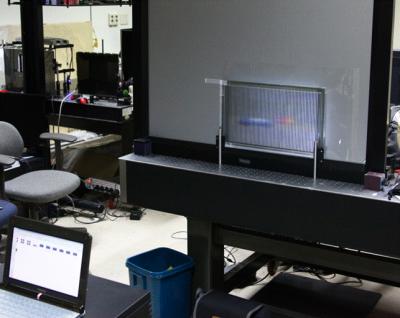A team of South Korean researchers carried out a new optics research that provides an outlook on 3-D display technology to bring glasses-free experience to commercial theaters. This new technique has been illustrated in a paper published in the Optical Society's (OSA) open-access journal Optics Express, representing improved dimension while utilizing space proficiently and more cost-effectivly when compared to existing 3-D projection technology.

Next generation 3-D theater
Polarization is considered as one of the most essential properties of light. Linear or circularly polarized light can bring modern 3-D effects to movie theaters. Two projectors show two similar images concurrently on a single screen, creating 3-D effect, where the images are a bit offset. Only a single state of polarized light can pass via each of the projector’s lens. By wearing the familiar polarized glasses, each eye recognizes only one of the offset images, the resulting depth cues are construed as 3-D by the brain.
Due to their complexities, two-projector method and parallax barrier method are not preferred. Several single projector methods have been created to provide similar effects.
The South Korean team has revolutionized a method to attain a similar glasses-free experience, where a single front projector is installed against a screen. Polarizers provide Venetian blinds' "slat" effect in this system. After being reflected from the screen, the light’s passage is obstructed by polarizers. Researchers supplemented ‘quarter-wave retarding film’ to the screen in order to obstruct the necessary portion of light. The polarization state of light will be altered by this film, thereby blocking its passage via polarizers. The offset effect results following the passage or reflection of light through or between polarizing slates. Additionally, depth cues are created, giving the viewer a vibrant 3-D effect without using glasses.
The team's experimental results show that this method is effective for deployment in two types of 3-D displays- parallax barrier method and 2D array of lenses-based integral imaging.
Based on passive polarization-activated lens arrays and the lenticular lens approach, researchers are focused on advancing this technique to develop other single-projector, frontal methods of 3-D display.
Source: http://www.osa.org/
Disclaimer: The views expressed here are those of the author expressed in their private capacity and do not necessarily represent the views of AZoM.com Limited T/A AZoNetwork the owner and operator of this website. This disclaimer forms part of the Terms and conditions of use of this website.